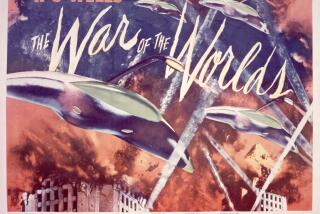War of the Worlds by H. G. Wells, read by Robert Hardy (Listen for Pleasure Books on Cassette: $9.98; 2 cassettes)
- Share via
“War of the Worlds” by H. G. Wells will be a century old in 11 years, and despite spates of sci-fi and updated space literature since it was first published, it remains an undisturbed classic. Nothing has been changed by scientific evidence that Mars, home of the villains of the piece, does not have an amoeba on its surface, let alone a race of predators capable of building monstrous weapons and invading a sister planet across a quarter billion miles of space.
Wells’ story keeps renewing itself through incarnations such as the Orson Welles radio dramatization of 1938, which traumatized thousands of listeners and created panic in parts of the country. A Spanish-language version broadcast in South America a year later, so aroused a volatile public that the station was attacked and several of its employees killed.
What brings an 89-year-old “War of the Worlds” to mind and to this page, is the current release of a two-cassette abridgement of the story, read by the British actor Robert Hardy. If, as projected by Ray Bradbury in “Fahrenheit 451,” all books were burned by a draconic government and literature had to rely for preservation on being memorized and spoken, nobody could do it better than Hardy. His performance is impeccable, a model that could be studied with profit in every last school of dramatic art, not excepting the Actors Studio.
The narrative and descriptive power of the story and Wells’ many skills are too well known to be reviewed here, but what invites comment in 1987 is the irony implicit in a tale of a world-threatening force launched from Mars to destroy us with horrendous weapons and a heat ray that incinerates everything it touches. It is painfully manifest that what readers in 1898 perceived as horrifying--a ghastly destructive power unleashed by ruthless aliens from another world--no longer belongs to fantasy and fiction. For it is our own species, Homo sapiens, and not wicked Martians, who have developed the ultimate in instruments of annihilation. Scenes that seemed hallucinatory when Wells wrote them, including the mass exodus from London when the Martians strike, have now become a realistic scenario of atomic attack.
“Never before in the history of this world had such a mass of human beings moved and suffered together--and this was no disciplined march--it was a stampede, gigantic and terrible, without order and without a goal . . . houses dissolved at the touch of heat waves . . . swift liquefaction of the social body . . . wantonness of power . . . an empire of man has passed away.”
Grim parallels aside, this edition of a great old warhorse strengthens the case for books on cassette. Far from alienating recalcitrant readers from the printed page, audible texts that are543257376novel has been known to stimulate sales of the original.
More to Read
Sign up for our Book Club newsletter
Get the latest news, events and more from the Los Angeles Times Book Club, and help us get L.A. reading and talking.
You may occasionally receive promotional content from the Los Angeles Times.









